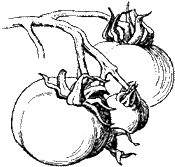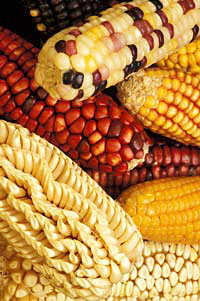Saving Our Seeds
We honor the farmers of the world in their work.
In stewarding the earth, in planting the seeds,
nourishing them, and bringing them to harvest.
We ask for blessing upon their hands and hearts.
As they carry on the ancient work of sustaining
cultural survival through this sacred task.
--- Jerilyn Brusseau
Our Mission
Our mission is to promote sustainable, ecological, organic vegetable seed production in the Mid-Atlantic and South. Saving Our Seeds provides information, resources, and publications for gardeners, farmers, seed savers, and seed growers.
Why grow and save your own seed?
The genetic reservoir and uniqueness of our vegetable seed heritage resides principally in three places: (1) the USDA seed bank, (2) small specialized seed companies, and (3) small family farms, especially those in ethnic communities. Unfortunately, these are all at risk. Federally sponsored government institutions such as the USDA seed bank are subject to periodic funding crises. Small, specialized seed companies (which offer many unique varieties) have low market penetration, are labor intensive, and are subject to market pressures which put them at risk. Small family farms are at risk from urbanization, rural outmigration, and economic change. In addition, multinational corporations are replacing multi-crop fields with monocultures, replacing traditional varieties with hybrids, and polluting open-pollinated varieties with genetically modified crops. Gardeners and farmers have assumed that the primary sources of seed will always be available as raw material for the food production system. Yet increasingly this assumption is unsustainable. We need to teach ourselves and our children that stewardship of our seed resources is a community responsibility that begins on the local level.
By growing and saving our own seed we can reverse this trend and take responsibility for the quality and sustainability of our own food supply. But there are other reasons as well. We can do a better job of genetically managing our seed crops than large multi-national companies. We can breed, select, and grow crops suited for our regional needs by focusing on local adaptability, disease and insect tolerance, and climate hardiness, all while improving flavor and other qualities. We can produce higher quality seed with a little self-education, just as our ancient ancestors did several thousand years ago when they domesticated wild plants and selected them for their needs. Prior to 1784 (when the first seed company was formed), farmers and gardeners selected, bred, produced, and traded their own seed for generations. Seeds were held in community rather than institutions. As recipients of this rich biological and cultural heritage we have the responsibility to become stewards of that heritage.

Saving Our Seeds is under on-going development. Check back every couple months to view added material, including instructional photographs and tutorials.
Thank you for visiting.
